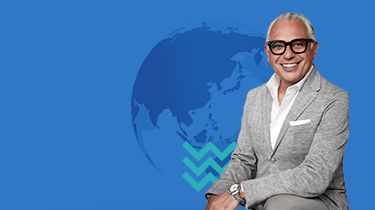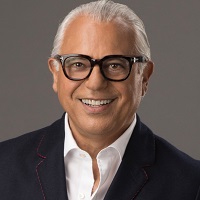
MyEDC gets you the answers you need
Join more than 30,000 Canadians who rely on MyEDC to grow their businesses with confidence.
Feb. 7, 2024

On this week’s Export Impact Podcast, host Joe Mimran is joined by Sven List, senior vice-president, Corporate and International, at Export Development Canada, and Lyne Jacques, chief revenue officer with Miovision, to talk about the importance of international trade, specifically in the Indo-Pacific region, for Canadian companies. Our guests offer expert insights into what the future holds for Canadian businesses looking to expand into global markets.
Where to listen
Follow us on your favourite streaming platforms to never miss an episode of the Export Impact Podcast. Tune into our podcast for new episodes every second Wednesday at 6 a.m. ET.
Joe Mimran (00:01) Hello and welcome to the EDC Export Impact. We’re going to be discussing opportunities for Canadian business in the Indo-Pacific region and why it needs to be at the top of your expansion plan list if it isn’t already.
Joining us is Lyne Jacques, the chief revenue officer for Miovision, a Canadian cleantech company that’s already doing business in the Indo-Pacific and is actively planning to expand its footprint there. We also have Sven List with us. Sven is the senior vice-president of EDC’s Corporate and International Group. And as you probably already know, EDC is a major player on Team Canada, which is responsible for helping Canadian businesses grow globally.
I’d like to begin today’s episode by acknowledging that we’re recording from my office in Toronto, which is on the traditional unceded territory of many nations, including the Mississaugas of the Credit, the Anishnabeg, the Chippewa, the Haudenosaunee, and the Wendat peoples, and is now home to many diverse First Nations, Inuit and Metis people. We value taking this moment to deepen the appreciation of our Indigenous communities wherever we are, and to remind ourselves of our shared debt to Canada’s First Peoples.
Sven, why don’t we start with you? Can you give us a rundown on the Indo-Pacific market, its scope, and why it’s so important to Canada’s trade strategy? And of course, can you tell us why Canadian businesses should consider this region in their export plans?
Sven List (01:36): Yes, absolutely, Joe. Thank you. First of all, we need to acknowledge that we’re actually talking about a large region. The Indo-Pacific region, we’re really talking about 40 countries, including some of Canada’s key trading partners, like Australia, India, Japan, South Korea, and it’s growing. It’s estimated that by 2040, this region will hold about 50% of the global gross domestic product (GDP). Now, that’s substantial. In fact, right now, the Top 5 countries in this region have a combined GDP of just under US$30 trillion. And just by way of comparison, the European Union’s entire 27 member states have a combined GDP of just over $17 trillion.
Let’s touch on market size. Demographically speaking, the Indo-Pacific region is home to 65% of the world’s population. By 2040, it’s estimated that the region will account for 40% of global consumption. But you know, beyond the numbers, it’s about how the Indo-Pacific region is growing. We’re talking about a rising middle class and a growing demand for more proteins, better quality agri-food, more consumer goods and digital delivery channels. In addition, this region is in an energy transition mode of its own with its own net zero goals.
As some countries in the region are still developing, there’s a high demand for infrastructure, especially infrastructure wrapped around cleantech. We’re talking in the US$6-$10 trillion range. That’s huge. Many of these projects pose opportunity to leapfrog traditional technologies and accelerate growth. There’s a high demand for digitization and manufacturing innovation in the region and quite frankly, geopolitically, we’re seeing a re-orientation of supply chains in these markets that are going to bring opportunities with them.
So, why is this so important for Canada, for Canadian companies? You know, Canada has a problem. Compared to other OECD (Organisation for Economic Co-operation and Development) economies, we’re underperforming on the international trade front. Canada has been losing market share of international trade over the years, and if we want to regain our standing as the leading trading nation, we need to step up our game. Now, our government has identified the Indo-Pacific as a priority market, and we are, at EDC, walking in lockstep. We’re looking to help grow Canada’s participation in this region; supporting through investments; supporting through loans, and helping Canadian companies find traction there. Right now, we’re focused on India, Indonesia, South Korea, Singapore, Australia, among others. If you’re a Canadian company in agriculture or agri-food, in the infrastructure, advanced manufacturing or digitalization sectors, you need to be looking at these markets. This is where growth will be centred in the decades to come.
Joe Mimran (04:42): So, there are lots of great reasons to focus on the Indo-Pacific. If you’re a Canadian exporter, we know EDC’s job is to help Canadian companies do business around the world. But can you tell us what EDC is doing specifically to help them gain traction in these markets?
Sven List (04:59): Quite frankly, that’s a big question and we have quite a lot going on in the region. First of all, EDC has boots on the ground in many of these markets and has so for decades. Around the world, we have 20 representations in 14 countries, and in the broader Asia-Pacific region, you’ll find us in New Delhi and Mumbai, in Singapore and Beijing and Shanghai. In fact, Singapore is our hub in the region and we, ourselves, are growing our presence there with a dedicated team, both for the business development side, as well as the underwriting side of our business.
This year, we’re planning to open additional representations: One in Indonesia and one in South Korea. So, you can see that we’re also living what we’re preaching. We’re expanding in the region and it’s not just EDC promoting Canadian trade. EDC works closely with Canada’s Trade Commissioner Service, or the TCS for short, and they’re also a key player on Team Canada to make Canada succeed in the region.
So, what do we do there? We’re focused on building partnerships, strategic critical partnerships and networks with some of the biggest conglomerates and corporates in the region, with governments, with the financial institutions there, with all the various players in the trade ecosystems in the region. We know that this market is relationship-driven and establishing the right relationships from the get-go is key to long-term success. And we’re also on the ground, as I said, building market knowledge. We’re looking at where the opportunities are; we’re looking at regulations at competition, at language culture and other potential barriers, so that we can share this information with Canadian companies.
Lastly, we also do what we’re known for doing best: We assess risks. We’re mapping out how to take smart risks in the region, so that we can share that with Canadian companies. And we do all of this to help build Canadian capacity to be able to make the right introductions to Canadian companies in the region, so that they can feed into the critical supply chains in the region.
Now, Joe, you might wonder how we go about doing this. We use all the information intelligence and relationships we have built to lead large companies, so we can establish a Canadian trade ecosystem and build awareness of our capabilities and capacity. The reality is where large Canadian companies succeed, more Canadian companies will follow of all sizes. This will pave the way for medium-sized Canadian companies in the short term, as the supply chains continue to globalize and smaller Canadian companies should also benefit in the longer term.
Now, having said all of this about the possibilities, let’s not make a mistake in thinking that there aren’t any challenges in the market. The business environment is complex; it’s fragmented and highly, highly competitive; incredibly price sensitive. There’s a fierce international competition, but frankly, the way that we look at it, if other economies and companies are succeeding there, so can we. Now, remember, this is a region that’s extremely relationship-driven as I mentioned. If you want to do business there, you’re going to have to play the long game. You’re going to have to be present here. And that’s not just an occasional visit; it’s really getting to know the environment, getting to know your counterparts, looking eye to eye, making a commitment to the region, letting them know you’re in it for the long haul.
From an ESG perspective, undoubtedly, there are some countries in the region that have challenges and we need to help Canadian companies understand what those are and how to manage them. Having said that, there’s already a considerable number of Canadian companies actively growing in this market. In fact, 22% of Canadian exporters already sell there, and 33% of current exporters are planning to expand there. Those who are already there are looking to expand to even more markets in the region.
A lot of Canadian exporters have found success in tapping into gateway markets, like Singapore and Australia, and we strongly encourage that these markets are more accessible, they have fewer challenges, and once Canadian companies have established themselves there and succeeded in these markets, it’s easier to break into the more challenging markets.
Joe Mimran (09:32): Thanks for that incredible overview. Sven. I think this is a good time to bring Lyne into the conversation. First off, Lyne, can you briefly explain to our audience what Miovision does?
Lyne Jacques (09:43): Miovision was founded 14 years ago and has 300 employees based in Kitchener, Ontario, with an office in Atlanta, Georgia, and an office in Cologne, Germany. What we do, we’re helping cities to be safer. We help optimize their traffic and we help them to reduce carbon emissions. We build two different types of solutions, one that is helping cities to temporarily do counting of intersections. We’ve been able to sell these solutions in 68 countries to 2,400 customers.
We’re now the second-largest player in North America to sell what we call permanent solutions that reside at the intersection that makes the intersection smarter. Our solutions are making the cities and the intersection four times more efficient. They’re saving 70 tonnes of CO2 emission per intersection and to date, we’ve been able to count through all our solutions, 30 billion vehicles, 1.5 billion pedestrians with a 96% of the level of accuracies. We’re all about making the intersection smarter and we’re all about helping new economies make their city smart.
Joe Mimran (11:12): Wow. Talk about cutting-edge technology that can make our neighbourhood safer and more environmentally friendly. Very impressive, Lyne, and very timely. Sven pointed out that there’s strong demand for infrastructure solutions in the Indo-Pacific, especially those involving cleantech. So, tell us how did Miovision make the leap into that region and in which countries specifically have you been successful?
Lyne Jacques (11:37): Like most of the smaller companies in Canada, you always start by being opportunistic, right? You reach out, you go to trade shows, you meet with different types of enterprises, and then you start to position your solution. Turns out that we’ve been significantly successful in, like Sven said, Australia and Singapore. Right now, we’re in eight countries in Southeast Asia, but we have more than 25 customers in Australia and eight customers in Singapore. We also have a significant presence in New Zealand and a small presence in Japan, and technically, we’ve been able to sell to India, Indonesia, China, but nothing was very planned for. Now, we’re aiming to double our business this year in Asia-Pacific, and we have a plan to go and be way more aggressive in 2024.
For me, I have to say, it’s my third amazing experience in APAC. I had the privilege of selling in 14 countries as the CP sales of our small Quebec software company where we had employee presence in India, Japan, Philippines, Singapore, China, and Australia. And we had an amazing experience there. At that time, APAC was our fourth market with 15% of our global revenue. In 2019, I had the privilege as the chief revenue officer of a smaller startup in AI (artificial intelligence) to get the support of the Canadian government and build a significant amount of business in Japan and Korea to the point where 40% of our overall business was made in these two countries.
I've been able to see how strong the relationship of the Canadian government with Japan can help small companies. With speed-dating activity and all kinds of trade shows, we’ve been able to have a significant amount of success. Now this time, my first time with EDC, but my third time in the market and I’m privileged to work with an amazing team based in Ottawa, and we’re mostly brainstorming on how we’re going to build this market this time in Asia-Pacific. We have plenty of ideas and amazing discussions.
Joe Mimran (14:15): Sven also mentioned earlier that the Canadian government has identified the Indo-Pacific as a priority market, and one of EDC’s key priorities is to help Canadian companies grow their business there. Tell us about Miovision’s future growth plans and how EDC has supported your expansion into that region.
Lyne Jacques (14:33): We’ve been lucky enough to be able to double our revenue in 2022, but the signs of our international business weren’t that big. Approximately 10% of our business was coming from international. So, when we sat down with EDC, we had the opportunity to discuss how we can significantly increase the international market. Asia-Pacific has been definitively one of the first elements and topics that was discussed with EDC and right now, what we’re doing with them, we have regular touchpoints and we have the two-punch approach: We’re trying right now to lend and extend on where we have an official presence.
So, in the eight countries, we’re ready for temporary solutions and also the 39 customers we have in market. We're hiring people, we’re planning on trade shows. But where EDC makes a big difference for us is for the permanent size of the business. This is a side that could be significant for us where we need help. What EDC has been able to do with us is help us to target the proper countries, do a little bit of research on the economics, and also on the partner where we’re choosing or aiming to work with. It’s very critical when you do business in these markets to make sure that you have a strong due diligence process and you understand what are the right questions that you need to ask in the market. EDC is helping us, giving us very good advice on how to do good due diligence of countries and partners.
This year, we’re aiming to get to 16% of our overall business internationally. From 2%-3% Asia-Pacific, we want to get to a strong 4%-6%. We’re adding two resources in the market and EDC pointed us to a consultant who’s helping us with our permanent size of the business and helping us find the right partners.
Joe Mimran (17:02): For other Canadian companies, thinking about doing business in the Indo-Pacific region, can you share with us some of your top learnings and how you plan to apply them to your future expansion?
Lyne Jacques (17:13): The first thing, you need to be very humble when you do business in APAC. It’s not that the culture of doing business is different. You need to be on a learning mode. You need to adjust, reiterate, document, learn, adjust, and reiterate. And we’re not talking about adjust and reiterate. It’s not just about the go-to-market, it’s about the products, too. Sometimes, you believe that you have the right product that’s going to fit the perfect needs, but you need to be open to make some adjustments.
I feel that the Canadian business has an edge in that market most of the time because we’re friendly, we’re open, we’re flexible, and we’re listening. For all these good reasons, I believe that we can make a difference in that market. I would say be patient, right? When you talk to an investor, a journey in APAC isn’t a journey where you’re going to have a return on investment within a year. You have to take into consideration that it’s going to take two to three years to establish the right level of relationship and the right level of investment to be successful in the market.
So, you don’t go to APAC if you’re in a hurry. It’s very, very important that you share these guidelines when you’re with your investor. And that’s why I feel we’re so privileged to have EDC as an investor in our company because they understand that piece. They can help us make sure that our other investors are as patient as they are, right? Because otherwise, you’re going to be miserable. It’s relationship-driven, like Sven mentioned, so you need to take the time to build these relationships and you need to invest time and travel to be in country. And then you need to hire in country because of course with the time zone, there’s no way you can manage. You have to make that type of investment.
When you’re willing to do that, the reward is simply amazing. This market is growing significantly. In all my previous experience, the fastest-growing market region for the company was always APAC. So, when you invest, you learn, you do your research properly, you select properly your partner, you can have an amazing experience and great success.
Joe Mimran (20:00): Sven, like Lyne, you stress the importance of having boots on the ground and building in-market relationships in the Indo-Pacific region. Is there anything else Canadian companies should keep in mind if they want to be successful in that market?
Sven List (20:15): You know, I really like the way that Lyne reflected on it, so I’m just going to pretty much repeat what she said: You need to be humble and willing to learn. The culture of doing business in this region is different. One needs to remain flexible and adaptable, and foremost, and I can’t stress it enough, is put feet on the ground; do your homework to identify who you need to develop those close relationships with in the market and be ready to put in the time into developing these relationships. You really need to be relationship-oriented. Above all, think long term. Canada has a great brand internationally. With the right approach, Canadian companies have the right ingredients to be successful in the Indo-Pacific. We just need to tweak our thinking a little bit.
Joe Mimran (21:05): To wrap up our discussions, Sven, can you tell our listeners where they can find more information about the opportunities and challenges of doing business in the Indo-Pacific region?
Sven List (21:17): We’ve just launched a one-stop-shop for market intelligence on edc.ca on the Indo-Pacific region. So, that’s a great first step. Once there, you can download the market guide, which covers Singapore, Australia, India, Indonesia, and South Korea. Believe me, we’ll be adding more as we continue to learn more ourselves about this region. These market guides offer insights and analysis from EDC to help plan Canadian companies’ global expansion in the Indo-Pacific and the Asia region in general. We’ll link the guide in the episode’s description. And lastly, I would say don’t be shy, reach out to us. Here in Canada or in market, we’ll do our best to share our learnings and insights, so that Canadian companies can succeed internationally.
Joe Mimran (22:03): Thanks for joining us today on the Export Impact Podcast. If you enjoyed today’s episode, we’d love for you to subscribe, rate, and leave us a review on your favourite streaming platform. See you back here in two weeks.
Outro (22:19): This podcast is for information purposes only and doesn’t constitute any form of advice or recommendation whatsoever whether accounting, financial, investment, legal, tax, or other personal, commercial, or professional advice. EDC has not independently verified any of the information communicated herein and makes no representation, warranty, or guarantee whatsoever expressed or implied about the content, which shouldn’t be relied upon in any way by anyone for any purpose whatsoever. EDC accepts no responsibility and will have no liability whatsoever for any damages or other losses suffered as a result of this information. Its use or reliance thereon by anyone and EDC has no obligation to update or correct any of the content.
This podcast isn’t a substitute for due diligence, and the audience should seek their own independent, professional advice in respect to the contents of this podcast or any other related matter. In addition, this podcast shouldn’t be construed in any way as an endorsement or a recommendation by EDC or any form of promotion, offer to sell or recommendation of any company, product, or service. While the host and/or guest are customers of EDC, the views expressed herein aren’t those of EDC, our directors, officers, employees, affiliates, or subsidiaries.

Guest
Chief Revenue Officer, Miovision

Guest
Senior Vice-President, Corporate and International Group, Export Development Canada

Host
CEO of Joseph Mimran & Associates Inc., founder of Club Monaco & Joe Fresh, and former Dragon on CBC’s Dragons’ Den

Join more than 30,000 Canadians who rely on MyEDC to grow their businesses with confidence.

Insights and analysis from EDC to help plan your global expansion in the Indo-Pacific and Asia.

Build business connections and accelerate your international growth.